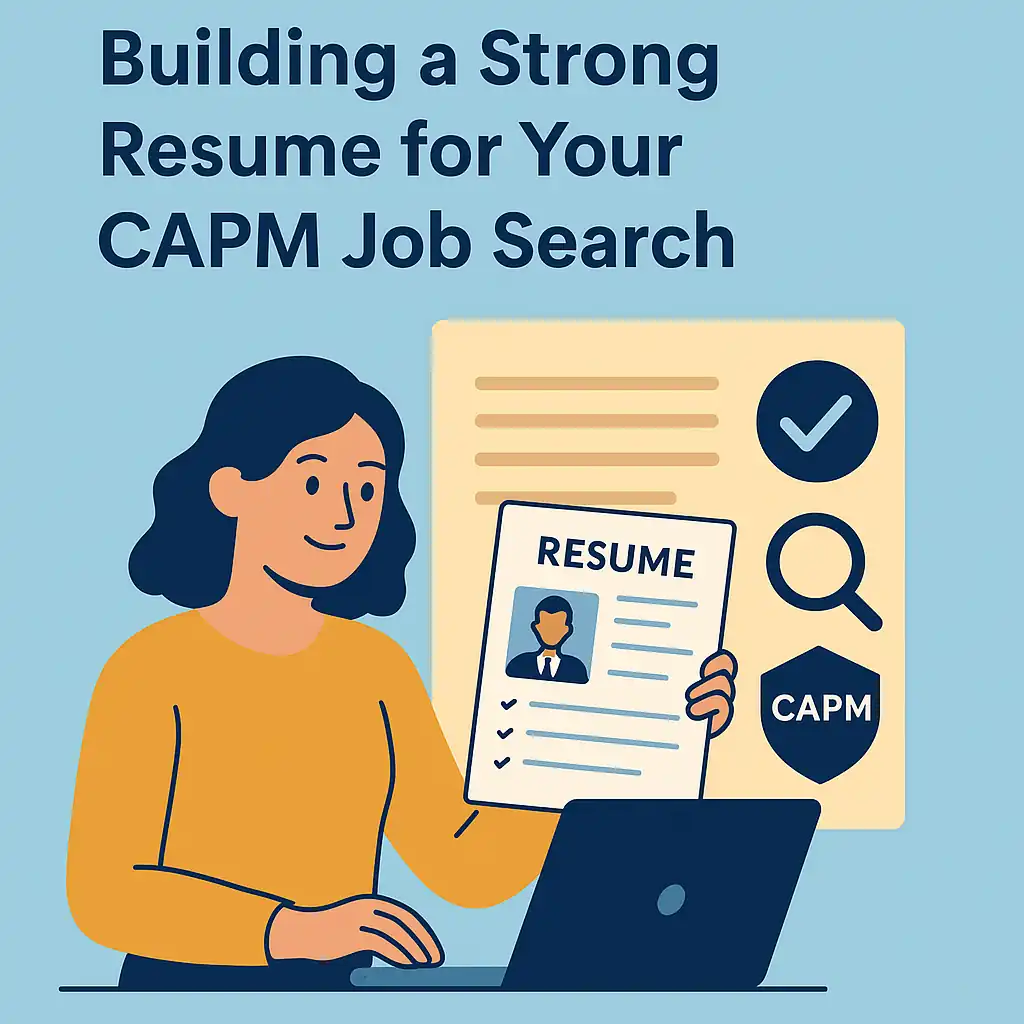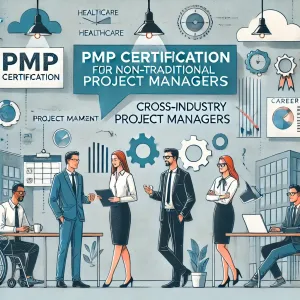Introduction
The Certified Associate in Project Management (CAPM) certification serves as a vital stepping stone for aspiring professionals. This credential, offered by the Project Management Institute (PMI), is designed for individuals who are looking to establish a foundational understanding of project management principles and practices. The CAPM certification is particularly relevant for entry-level positions, as it demonstrates a commitment to the field and a grasp of essential project management concepts, making candidates more attractive to potential employers.
The job market for entry-level project management roles is increasingly competitive. With many candidates vying for the same positions, it is crucial for job seekers to differentiate themselves. A well-crafted resume becomes an essential tool in this process, as it not only showcases relevant skills and experiences but also reflects the candidate’s professionalism and attention to detail. In a landscape where hiring managers often sift through numerous applications, a compelling resume can significantly enhance the chances of securing an interview.
A strong resume for CAPM job seekers should effectively highlight the skills acquired through the certification, such as project planning, risk management, and stakeholder communication. By emphasizing these competencies, candidates can present themselves as well-prepared and knowledgeable, ready to contribute to a team from day one. Ultimately, a thoughtfully constructed resume is not just a document; it is a powerful marketing tool that can open doors to exciting career opportunities in project management.
Understanding the CAPM Certification
The Certified Associate in Project Management (CAPM) certification is a valuable credential for individuals seeking to establish a career in project management, particularly at the entry level. Here’s an overview of what the CAPM certification entails, its significance, and how it can enhance your job prospects.
CAPM Certification Process and Prerequisites
To obtain the CAPM certification, candidates must meet specific prerequisites set by the Project Management Institute (PMI). The requirements include:
- Educational Background: Candidates must have a secondary degree (high school diploma or equivalent) and at least 23 hours of project management education before taking the exam. This education can be obtained through various training programs or courses that cover fundamental project management concepts [2][9].
- Exam Structure: The CAPM exam consists of 150 multiple-choice questions, which must be completed within three hours. The questions assess knowledge of project management processes, tools, and techniques as outlined in the PMBOK® Guide (Project Management Body of Knowledge) [3].
Skills and Knowledge Gained Through CAPM Training
Pursuing the CAPM certification equips candidates with essential skills and knowledge that are crucial for effective project management. Some of the key areas covered in CAPM training include:
- Project Management Fundamentals: Understanding the basic principles and methodologies of project management, including the project life cycle, stakeholder management, and risk assessment [12].
- Tools and Techniques: Learning about various project management tools and techniques, such as Gantt charts, critical path method, and resource allocation, which are vital for planning and executing projects successfully [12].
- Soft Skills Development: The training also emphasizes the development of soft skills, such as communication, teamwork, and problem-solving, which are essential for collaborating with project teams and stakeholders [10].
Credibility and Recognition of CAPM in the Project Management Field
The CAPM certification is widely recognized in the project management industry and serves as a testament to an individual’s commitment to the profession. Its credibility stems from:
- PMI Accreditation: The certification is administered by the Project Management Institute, a globally recognized authority in project management. This affiliation lends significant weight to the CAPM credential, making it a respected qualification among employers [4][9].
- Career Advancement Opportunities: Holding a CAPM certification can enhance job prospects for entry-level positions such as project coordinator, junior project manager, or project assistant. It demonstrates to potential employers that the candidate possesses foundational knowledge and a commitment to professional development in project management [1][3].
Key Components of a Strong Resume
When pursuing entry-level positions in project management, particularly those requiring a Certified Associate in Project Management (CAPM) certification, crafting a strong resume is essential. A well-structured resume not only showcases your qualifications but also makes a lasting impression on potential employers. Here are the key components to include:
1. Clear and Professional Format
- Importance of Presentation: A clear and professional format is crucial for ensuring that your resume is easy to read and visually appealing. Hiring managers often sift through numerous applications, so a well-organized layout can help your resume stand out. Use consistent fonts, headings, and bullet points to enhance readability [1].
- One-Page Length: For entry-level positions, aim for a one-page resume. This length allows you to present the most relevant information concisely, which is vital for capturing the attention of hiring managers [4].
2. Strong Summary Statement
- Tailored Summary: A compelling summary statement is your opportunity to make a strong first impression. Tailor this section specifically for CAPM roles by highlighting your project management skills, relevant experiences, and career aspirations. This summary should encapsulate your qualifications and set the tone for the rest of your resume [10][11].
- Showcase Your Potential: Given that entry-level candidates may have limited experience, focus on your potential and willingness to learn. Emphasize your understanding of project management principles and your commitment to applying them in a professional setting [12].
3. Education, Certifications, and Relevant Coursework
- Highlight Educational Background: Clearly list your educational qualifications, including your degree and any relevant coursework that pertains to project management. This is particularly important for entry-level candidates who may not have extensive work experience [1][5].
- Certifications Matter: Include your CAPM certification prominently on your resume. This certification demonstrates your knowledge of project management principles and can significantly enhance your employability. Additionally, mention any other relevant certifications, such as PMP or Agile methodologies, to further showcase your qualifications [1][5].
- Relevant Coursework: If you have completed coursework related to project management, be sure to highlight it. This can include classes on project lifecycle, stakeholder engagement, and requirements gathering, which are essential skills for a project manager [6][7].
Highlighting Project Management Skills
When crafting a resume for entry-level positions that require a Certified Associate in Project Management (CAPM) certification, it is essential to effectively showcase your project management skills. Here are some key skills relevant to CAPM roles, along with examples of how to incorporate them into your resume.
Key Project Management Skills for CAPM Roles
- Time Management: The ability to prioritize tasks and manage time effectively is crucial in project management.
- Risk Management: Identifying potential risks and developing mitigation strategies is a vital skill.
- Communication: Clear and effective communication with team members and stakeholders is essential for project success.
- Leadership: Even in entry-level roles, demonstrating leadership qualities can set you apart.
- Problem-Solving: The ability to analyze issues and develop solutions is a key component of project management.
- Adaptability: Being flexible and able to adjust to changing project requirements is important.
- Stakeholder Management: Understanding and managing stakeholder expectations is critical for project success.
Incorporating Skills into Resume Bullet Points
To effectively highlight these skills on your resume, consider using the following examples as a guide:
- Time Management: “Successfully managed project timelines, ensuring 100% on-time delivery of project milestones.”
- Risk Management: “Identified potential project risks and developed mitigation strategies, reducing project delays by 20%.”
- Communication: “Facilitated weekly team meetings to enhance communication and collaboration, resulting in a 15% increase in team productivity.”
- Leadership: “Led a cross-functional team of 5 members in a project to improve process efficiency, achieving a 30% reduction in operational costs.”
- Problem-Solving: “Analyzed project challenges and implemented solutions that improved project outcomes by 25%.”
- Adaptability: “Adapted project plans in response to changing client requirements, maintaining project scope and budget.”
- Stakeholder Management: “Engaged with stakeholders to gather requirements and provide updates, enhancing stakeholder satisfaction by 40%.”
Enhancing Impact with Action Verbs and Quantifiable Achievements
To make your resume stand out, use action verbs that convey your contributions and achievements. Words like “managed,” “led,” “developed,” “analyzed,” and “facilitated” can add strength to your statements. Additionally, incorporating quantifiable achievements can significantly enhance the impact of your resume. For instance, instead of stating “improved team efficiency,” specify “improved team efficiency by 15% through the implementation of new project management tools.”
By focusing on these key project management skills and effectively incorporating them into your resume, you can create a compelling document that showcases your qualifications for entry-level CAPM roles. This approach not only highlights your skills but also demonstrates your readiness to contribute to potential employers.
Tailoring Your Resume for Specific Job Descriptions
When embarking on your job search, particularly for entry-level positions in project management with a Certified Associate in Project Management (CAPM) certification, customizing your resume for each application is crucial. A tailored resume not only showcases your qualifications but also demonstrates your genuine interest in the specific role. Here are some key points to consider when crafting your resume:
Analyzing Job Descriptions for Relevant Keywords and Skills
- Identify Key Terms: Start by carefully reading the job description to identify keywords and phrases that are frequently mentioned. These may include specific skills, methodologies (like Agile or Waterfall), and competencies (such as risk management or communication skills) that the employer is seeking. Highlight these terms as they will be essential in aligning your resume with the job requirements [1][2].
- Match Your Skills: Once you have identified the key terms, reflect on your own skills and experiences. Make a list of your qualifications that correspond to the job description. This could include relevant coursework, certifications, or any practical experience you have gained through internships or volunteer work [2][3].
Aligning Resume Content with Job Requirements
- Customize Your Summary: The summary section of your resume is your first opportunity to make an impression. Tailor this section to reflect the specific skills and experiences that are most relevant to the job you are applying for. For instance, if the job emphasizes teamwork and communication, highlight your experiences that demonstrate these abilities [4][5].
- Modify Experience Sections: In the experience section, focus on the roles and responsibilities that align with the job description. Use bullet points to clearly outline your achievements and how they relate to the skills required for the position. If a job description mentions project management tools, ensure you include any experience you have with those tools, even if it was in a classroom setting or during a project [6][7].
Tips for Effective Customization
- Use Action Verbs: Start each bullet point with strong action verbs to convey your contributions effectively. Words like “managed,” “coordinated,” and “developed” can help illustrate your proactive approach to project management tasks [8].
- Quantify Achievements: Whenever possible, quantify your achievements to provide context and impact. For example, instead of saying “assisted in project management,” you could say “assisted in managing a team of 5 to complete a project 10% under budget” [9].
- Proofread and Edit: Finally, ensure that your resume is free of errors and clearly formatted. A polished resume reflects your professionalism and attention to detail, which are critical traits in project management [10][11].
By taking the time to tailor your resume for each job application, you significantly increase your chances of standing out to potential employers. This approach not only highlights your CAPM skills but also demonstrates your commitment to the role, making you a more attractive candidate in the competitive field of project management.
Including Relevant Experience
When crafting a resume for entry-level positions in project management, particularly for those holding a Certified Associate in Project Management (CAPM) certification, it is crucial to effectively present your work experience, volunteer work, and internships. Here are some key points to consider:
- Value of Internships and Volunteer Experiences: Internships and volunteer roles can significantly enhance your resume, especially for entry-level candidates. These experiences provide practical exposure to project management principles and practices, allowing you to demonstrate your ability to contribute to a team and manage tasks effectively. Highlight any specific projects you worked on, the skills you developed, and the outcomes achieved during these experiences. This not only showcases your commitment to the field but also your ability to apply theoretical knowledge in real-world scenarios [1][2].
- Framing Non-Project Management Jobs: If your previous work experience does not directly relate to project management, it is essential to frame these roles in a way that highlights transferable skills. Focus on aspects such as teamwork, communication, problem-solving, and leadership. For instance, if you worked in customer service, emphasize your ability to manage client expectations and resolve conflicts, which are valuable skills in project management. By drawing connections between your past roles and project management competencies, you can present a well-rounded profile to potential employers [3][4].
- Including Group Projects and Academic Achievements: For students or recent graduates, including group projects or academic achievements related to project management can be beneficial. Detail any collaborative projects where you played a significant role, outlining your contributions and the skills you utilized. Additionally, mention any relevant coursework or certifications, such as CAPM, that demonstrate your knowledge and commitment to the field. This not only fills out your resume but also provides concrete examples of your ability to work in a project environment [5][6].
By strategically presenting your relevant experiences, you can create a compelling resume that effectively showcases your CAPM skills and positions you as a strong candidate for entry-level project management roles.
Utilizing Additional Sections for Competitive Edge
When crafting a resume for entry-level CAPM (Certified Associate in Project Management) jobs, it’s essential to go beyond the basic sections of education and experience. Including additional sections can significantly enhance your resume and make it stand out to potential employers. Here are some key areas to consider:
- Certifications: Highlighting your CAPM certification is crucial, but don’t stop there. If you have any other relevant certifications, such as Agile or Scrum methodologies, include them in a dedicated section. This demonstrates your commitment to professional development and your readiness to apply various project management methodologies in real-world scenarios. Employers often look for candidates who have taken the initiative to enhance their qualifications, which can set you apart from other applicants [1][2].
- Professional Affiliations: Being a member of professional organizations, such as the Project Management Institute (PMI), can add credibility to your resume. This section can showcase your engagement with the project management community and your dedication to staying updated on industry trends and best practices. Memberships can also provide networking opportunities, which are invaluable for job seekers [3][4].
- Relevant Coursework: If you are a recent graduate or still in school, including a section for relevant coursework can be beneficial. This allows you to showcase specific classes that have equipped you with project management skills, such as risk management, project planning, or team dynamics. Tailoring this section to align with the job description can help demonstrate your preparedness for the role [5][6].
- Skills Section: A well-crafted skills section is vital for any resume, especially for CAPM positions. Be sure to include both hard skills (like project scheduling, budgeting, and risk assessment) and soft skills (such as communication, leadership, and problem-solving). This dual approach not only highlights your technical capabilities but also your interpersonal skills, which are crucial in project management roles [7][8].
- Portfolio or Links to Relevant Projects: If applicable, consider including a portfolio or links to projects you have worked on, whether in an academic setting or through internships. This can provide tangible evidence of your skills and experience, allowing potential employers to see your work firsthand. Including a portfolio can be particularly advantageous in demonstrating your ability to manage projects from inception to completion [9][10].
By thoughtfully incorporating these additional sections into your resume, you can create a compelling narrative that showcases your qualifications for CAPM jobs. This strategic approach not only enhances your resume but also positions you as a well-rounded candidate ready to take on the challenges of project management.
Common Resume Mistakes to Avoid
When crafting a resume for entry-level CAPM (Certified Associate in Project Management) jobs, it’s crucial to present yourself effectively to stand out in a competitive job market. Here are some common mistakes to avoid that can hinder your chances of landing an interview:
- Typos and Grammar Mistakes: One of the most detrimental errors job seekers can make is submitting a resume filled with spelling and grammatical errors. Research indicates that over 60% of resumes contain such mistakes, which can severely undermine your professionalism and attention to detail. For instance, listing “perfectoinism” as a skill could easily sabotage your application [8].
- Overly Complex Language: Using jargon or overly complex language can confuse hiring managers and detract from the clarity of your resume. It’s essential to communicate your skills and experiences in a straightforward manner. Instead of using convoluted phrases, aim for clear and concise descriptions that effectively convey your qualifications [1].
- Vague Descriptions: Providing vague or generic descriptions of your experiences can make it difficult for employers to understand your specific contributions and skills. Instead of saying you “assisted in project management,” specify your role and achievements, such as “coordinated team meetings and tracked project milestones to ensure timely completion” [5].
- One-Size-Fits-All Resume: Many job seekers mistakenly believe that a single resume can suffice for all applications. This approach can be detrimental, as it fails to highlight the specific skills and experiences relevant to each job. Tailoring your resume for each position demonstrates your understanding of the role and shows that you have done your research [2][13].
- Neglecting Proofreading: Skipping the proofreading step can lead to careless mistakes that may cost you an interview. Always take the time to review your resume multiple times and consider seeking feedback from peers or mentors. A fresh set of eyes can catch errors you might have overlooked and provide valuable insights on how to improve your resume [6].
By avoiding these common pitfalls, you can create a compelling resume that effectively showcases your CAPM skills and increases your chances of success in your job search. Remember, a well-crafted resume is your first step toward securing an entry-level position in project management.
Conclusion
In the competitive landscape of entry-level project management positions, particularly for those holding a Certified Associate in Project Management (CAPM) certification, a strong resume is essential. It serves as your first impression to potential employers and can significantly influence their decision to invite you for an interview. A well-crafted resume not only showcases your qualifications but also highlights your commitment to the field of project management.
As you embark on your CAPM job search, it is crucial to take the time to tailor your resume to reflect your unique skills and experiences. This means emphasizing relevant coursework, certifications, and any project-related experiences that demonstrate your understanding of project management principles. By aligning your resume with the specific requirements of the job descriptions you are targeting, you can effectively communicate your potential value to hiring managers.
To further enhance your resume, consider sharing it with mentors or industry professionals who can provide constructive feedback. Utilizing online resources, such as resume-building tools and templates, can also help you refine your document and ensure it meets industry standards.
In summary, investing effort into creating a compelling resume is a vital step in your CAPM job search. Take action today by reviewing and updating your resume, seeking feedback, and utilizing available resources to position yourself for success in the project management field.
Find out more about Shaun Stoltz https://www.shaunstoltz.com/about/.
This post was written by an AI and reviewed/edited by a human.



